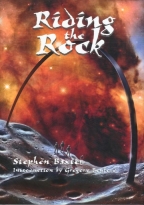Riding the Rock
Stephen Baxter
PS Publishing
UK Hardcover First
ISBN 1-902-88060-9
Publication Date: 11-01-2002
61 Pages; $40.00
Date Reviewed: 00-00-03
Reviewed by Rick Kleffel © 2003

REFERENCES
COLUMNS
|
|
|
Riding the RockStephen BaxterPS PublishingUK Hardcover FirstISBN 1-902-88060-9Publication Date: 11-01-200261 Pages; $40.00Date Reviewed: 00-00-03Reviewed by Rick Kleffel © 2003 |
|
|
REFERENCES |
COLUMNS |
Fact-based so-called "hard" science fiction isn't on the front lines of my favorite types of fiction. Usually it leaves me rather cold. Science is so malleable that today's 'hard SF' is tomorrow's story of an expedition to the edge of the flat earth. The attractions of reading about the cutting edge of science are rather lost to this reader. I must admit that the harsh tone of Stephen Baxter's 'Riding the Rock' initially left me feeling alienated and distanced from the narrative. But fortunately for this reader, a combination of current events and good writing brought 'Riding the Rock' into a perspective that turned it from a dry and unpleasant treatise on physics and war into a quick, gripping trip to the center of the galaxy.
Gregory Benford starts things off with an interesting and rather polemic introduction about the virtues of hard SF, Benford's history with hard SF and Baxter's novella. For a short piece, it covers a lot of ground, is rather interesting, and surely strongly felt. Benford also manages to talk about the novella without giving away the plot or ruining the story. In point of fact, his introduction is an effective aid for bring the reader closer to this hard-edged tale.
'Riding the Rock' is a sequel to Baxter's first PS Publishing novella, 'Reality Dust'. Both are set in his 'Xeelee Conflict' universe, in which humanity has met an implacable foe in the galaxy that ignore humanity until it decides to obliterate it. No communication have been exchanged between the species. It's a long hard war.
Baxter does not spend a lot of time creating a baroque and complicated human civilization, or a particularly detailed alien civilization here, though he might more detail on both in the other books he's written about the conflict. Here, he boils it all down WWI-style trench warfare, on a galactic scale. Humans have been forced to discard much of what we currently consider makes us human. The message is fairly unpleasant to this currently living human. In Baxter's vision, the ultimate answer is to raise children in n atmosphere of constant life-threatening combat and then send them out to die by the age of 13.
But when Baxter starts talking about war as an exercise in statistics, he starts making points. And his final scenes of battle are as vivid as anything else I've read in the genre. The enemy may be practically invisible, but they're not utterly invincible. I'll admit that I wasn't quite ready to buy the necessity of trench warfare in galactic combat, but then hard SF isn't always about prediction. The generally unlikable characters are counterweighted by Luca, who has some shreds of what we currently consider human. They're not obliterated by the events in the novella.
In its favor, 'Riding the Rock' is short, sharp and to the point. The points are interesting, and the characters may not be folks you'd like to have for dinner but they're utterly memorable. The commentary about perpetual war could not be more timely, though it clearly wasn't intended as a commentary on current events. In the end, that's what won me over. Baxter 's passionate stance on hard statistical nature of mass murder in the name of war is the kind of fuzzy non-science that hard SF usually eschews in the name of physics. Here, it makes it clear that Baxter is writing from the heart.